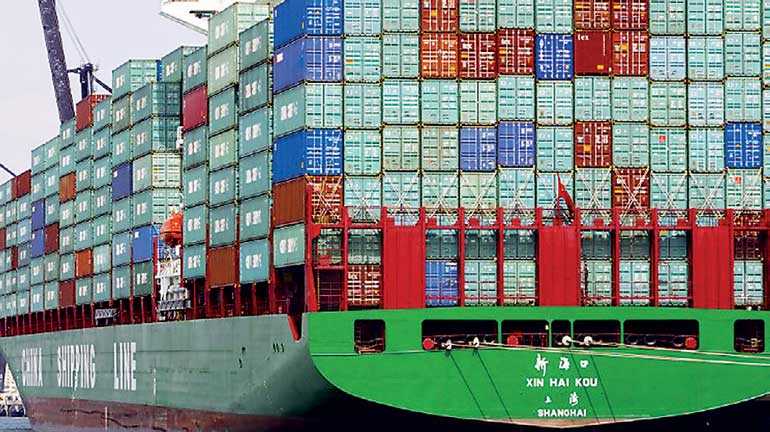Friday Feb 27, 2026
Friday Feb 27, 2026
Thursday, 20 September 2018 00:10 - - {{hitsCtrl.values.hits}}

(FILES) In this file photo taken on July 31, 2006 cargo is stacked high on a China Shipping Line freighter at Miami Beach, Florida.
WASHINGTON/BEIJING (Reuters): China and the United States plunged deeper into a trade war on Tuesday after Beijing added $60 billion of US products to its import tariff list in retaliation for President Donald Trump’s planned levies on $200 billion worth of Chinese goods.
The tit-for-tat measures are the latest escalation in an increasingly protracted trade dispute between the world’s two largest economies.
On Monday, the US administration said it will begin to levy new tariffs of 10% on about $200 billion of Chinese products on Sept. 24, with the tariffs to go up to 25% by the end of 2018.
“China is forced to respond to US unilateralism and trade protectionism, and has no choice but to respond with its own tariffs,” the Finance Ministry said in a statement on its website on Tuesday.
Beijing will impose levies on a total of 5,207 US products – ranging from liquefied natural gas to certain types of aircraft as well as cocoa powder and frozen vegetables – at 5 and 10%, instead of previously proposed rates of 5, 10, 20 and 25%, the finance ministry said.
Both countries’ tariffs come into force on Sept. 24.
So far, the United States has imposed tariffs on $50 billion worth of Chinese products to pressure China to make sweeping changes to its trade, technology transfer and high-tech industrial subsidy policies.
Beijing has retaliated in kind, but some analysts and American businesses are concerned it could resort to other measures such as pressuring US companies operating in China.
While both sides said they were open to talks, Trump launched a Twitter broadside at China, accusing Beijing of targeting rural voters who had supported his presidency by hitting agricultural goods.
“China has openly stated that they are actively trying to impact and change our election by attacking our farmers, ranchers and industrial workers because of their loyalty to me,” Trump wrote.
It was not clear what statement from Beijing Trump was referring to in his post. A short video published this summer by Beijing had suggested that farmers would not vote for Trump if their incomes were hurt by his trade policies.
Trump warned on Monday that if China takes retaliatory action against US farmers or industries, “we will immediately pursue phase three, which is tariffs on approximately $267 billion of additional imports.”
Very unfortunate
A senior Chinese securities market official said US trade actions will fail as China has ample fiscal and monetary policy tools to cope with the impact. The government has already been ramping up spending on infrastructure.
“President Trump is a hard-hitting businessman, and he tries to put pressure on China so he can get concessions from our negotiations. I think that kind of tactic is not going to work with China,” Fang Xinghai, vice chairman of China’s securities regulator, said at a conference in the port city of Tianjin.
Trump’s latest escalation of tariffs on China comes after several rounds of talks yielded no progress. US Treasury Secretary Steven Mnuchin last week invited top Chinese officials to discussions.
In light of the US action, China is reviewing plans to send a delegation to Washington for new talks, the South China Morning Post reported on Tuesday, citing a government source in Beijing.
The Wall Street Journal reported that Beijing was considering sending Vice Commerce Minister Wang Shouwen to trade talks this month but not Vice Premier Liu He, a senior official who is close to China’s president.
US Commerce Secretary Wilbur Ross said on Tuesday the next step on holding “constructive negotiations” was up to China.
“So the question about whether or when to have a discussion is very importantly in their ballpark,” Ross told CNBC.
Fang told the Tianjin forum that he hopes the two sides can sit down and talk, but added that the latest US move has “poisoned” the atmosphere.
The European Union trade chief said the tariff issues between the two should be resolved through the World Trade Organization. The EU and the United States have declared a truce in their own trade dispute while they negotiate.
“Trade wars are not good and they are not easy to win, and this escalation is of course very unfortunate,” European Trade Commissioner Cecilia Malmstrom told reporters, echoing one of Trump’s catch phrases that trade wars were easy to win.
China’s yuan currency slipped against the dollar on Tuesday after news of the US measures. It has weakened by about 6.0% since mid-June, offsetting the 10% tariff rate by a considerable margin.
US stock markets opened higher and the Nasdaq index was up 1 over 1% by mid-morning.